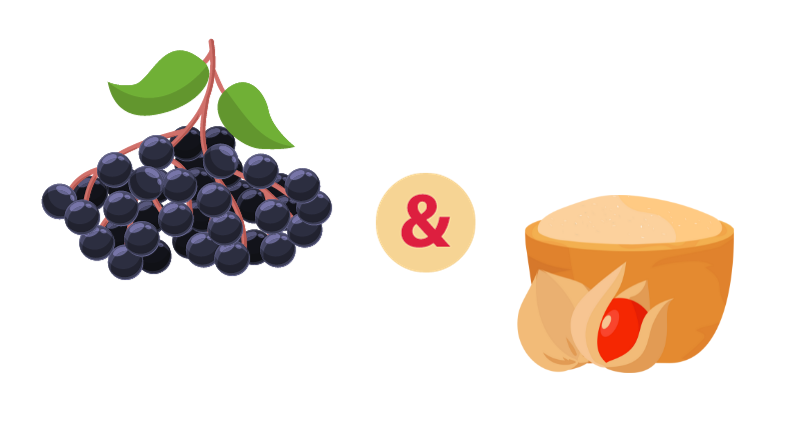In the wild world of holistic medicine every herbal leaf, root, and berry is a tapestry of health that has been uncovered since ancient times and researched now. In the context of people constantly resorting to nature in search of answers, the ‘herbal synergy’ concept has come to the centre stage.
It’s the deep thought that combining a number of herbs can result in the advantages of each herb being synergized into a strong force offering a holistic effect better than the simple sum of these herbs. But, how does this principle get displayed when we look into two potent plant medications such as elderberry and ash-wagandha?
This excursion takes a look at the power and grace of these two treasured plants in tandem, opposing the mystique about them as individual plants and what may occur when they join.
Keeping this in mind, let us go deeper into the world of ashwagandha and elderberry, get to grips with their distinct characteristics, and come to an answer as to whether they indeed combine to form a responsive chord in the orchestra of herbal synergy.
SYNERGY OR SEPARATION: ASHWAGANDHA & ELDERBERRY IN THE SAME COMBINATION?
Potentiation of the immune-enhancing, as well as anti-inflammatory effects of ashwagandha and elderberry, is possible if taken together. Nevertheless, as is the case with supplements, the importance of possible interactions and individual tolerance needs to be stressed.
Currently, there aren’t much direct studies on the co-consumption of ashwagandha and elderberry. Like before, it is critical to consult your healthcare provider before starting any herbal regime.
COMPARING THE BENEFITS: ASHWAGANDHA & ELDERBERRY SIDE BY SIDE
While herbs may be respected separately, the things to look out for with their combined effects is where things get the most interesting.
IMMUNE BOOSTING
And elderberry and ashwagandha possess immune-boosting properties, too. Elderberry, however, directly aids the body to respond to immune response, while, ashwagandha works by regulating the immune functions, especially those in stress.
ANTI-INFLAMMATORY
Inflammation is a function of the body, but in chronic inflammation, many health issues are created. The two herbs have been shown to have possibilities that include curbing inflammation [^5^].
STRESS REDUCTION
Beneficial properties of Ashwagandha like adaptogens help in reducing stress by balancing the level of cortisol in the body. Elderberry might be absent the adaptogenic, but it can be nutritionally beneficial to the whole being.
ASHWAGANDHA: THE STRENGTH OF A STALLION
Ashwagandha, which is the scientific name Withania somnifera, is a root that have been has been highly revered in Ayurvedic medicine for more than 3,000 years. Well, this adaptogen not only deals with stress but also is used to fight inflammation, strengthen the immune system, boost endurance, and even help with brain health[^1^].
THE HISTORY OF ASHWAGANDHA
Delving into history, ashwagandha was a staple in ancient India, the Middle East, and parts of Africa. Its name means “smell of the horse” in Sanskrit, which is a tribute both to its unique aroma and its ability to increase strength.
Ancient practitioners believed in its potential to rejuvenate the body, sharpen the mind, and optimize vitality[^2^].
ELDERBERRY: THE IMMUNE BOOSTER
Elderberry, scientifically known as Sambucus nigra is deeply coloured and has been used to this day. These berries are famous for their immune-enhancing power because of their rich sources of vitamins and antioxidants[^3^].
Antibodies are not the only area where elderberries have demonstrated promise; it has also been thought to help with allergy relief and the reduction of inflammation and even flu symptoms[^4^].
CHOOSING TO USE BOTH SUPPLEMENTS TOGETHER IN YOUR DIET
In contrast to elderberries that can be consumed directly or in syrups, ashwagandha might not be a palatable option for some. Here are a few ways to incorporate them:Here are a few ways to incorporate them:
Smoothies: Mix elderberries with other fruits inclusive of a drop of ashwagandha tincture.
Teas: Brew elderberry tea and add a few drops of ashwagandha tincture. The best version of this short sentence would be written as two lines. Sentence two is not required to be a continuation of the first one; in this case, we’ll just add a new line.
Soups and Broths: Deeper your soups with elderberries and a shot of ashwagandha.
CAPSULE, POWDER, OR TINCTURE: CHOOSE BETWEEN ASHWAGANDHA
Even if ashwagandha is being offered in a variety of different forms, the tinctures are the object of recent interests. The benefits of ashwagandha tinctures over traditional capsules or powders include:The benefits of ashwagandha tinctures over traditional capsules or powders include:
Rapid Absorption: Alcohol tinctures are right away absorbed into the blood stream and so they act quicker.
Convenience: Not necessary for water nor the measures of dose.
Long Shelf Life: Tinctures, in comparison, has a more extended shelf life than powders.
SUPPLEMENT INDUSTRY TRENDS
Though the article under discussion essentially revolves around ashwagandha and elderberry, it is not easy to not notice the fact that creatine is gaining popularity. Since its introduction, creatine has been both praised for its muscle-building properties and scrutinized for potential side effects.
Due to its great popularity among athletes and fitness fanatics, it is an all-time hit among health supplements [^6^].
CONCLUSION
The world of herbal supplements is immense and wide-ranging. The ashwagandha and elderberry pairing present a possibility to explore, however, it must be done with knowledge and care.
The two are greatly endowed with a rich history and the prospective health advantages that could make them the powerhouse duo you have been looking for.
REFERENCES
- Mishra, L., Singh, B., & Dagenais, S. (2000). Scientific basis for the therapeutic use of Withania somnifera (ashwagandha).
- Winston, D., & Maimes, S. (2007). Adaptogens: Herbs for strength, stamina, and stress relief.
- Zakay-Rones, Z., Thom, E., Wollan, T., & Wadstein, J. (2004). Randomized study of the efficacy and safety of oral elderberry extract.
- Hawkins, J., Baker, C., Cherry, L., & Dunne, E. (2019). Black elderberry (Sambucus nigra) supplementation effectively treats upper respiratory symptoms.
- Kaushik, M., Kaur, P., & Sharma, D. (2019). Therapeutic potential of elderberry extract in immune responses.
- Buford, T. W., Kreider, R. B., Stout, J. R., & Greenwood, M. (2007). International Society of Sports Nutrition position stand: creatine supplementation and exercise.


